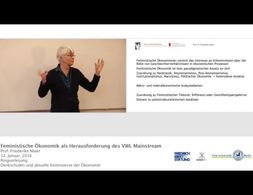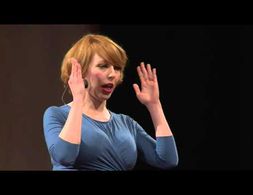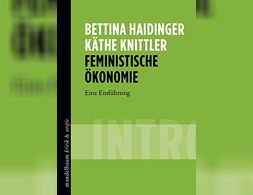16 Ergebnisse
Neben alten und aktuellen Diskursen der Feministischen Ökonomik stellt Adelheid Biesecker deren Kritik am Ökonomischen Mainstream vor: das Denken in Dualismen und den Ausschluss von sozialer und ökologischer Reproduktion aus der Ökonomie. Dabei geht sie auch auf das Wissenschaftsverständnis feministischer Ökonominnen ein und erläutert unterschiedliche Bedeutungen von Gender in der Ökonomie. Aufbauend auf ihren Analysen stellt Biesecker Überlegungen zur Ausgestaltung einer zukunftsfähigen Wirtschaftsordnung und Konzepte wie Vorsorgendes Wirtschaften vor. Ein Fokus des Vortrags liegt auf dem Arbeitsbegriff und Care.
Friederike Maier gibt eine Einführung in die Feministische Ökonomik, die sie als sehr heterogenes Feld mit unterschiedlichen feministischen Zugängen zur Ökonomie begreift (exklusive poststrukturalistischer Ansätze). Neben deren Kritik am Mainstream stellt sie zudem Themenschwerpunkte wie Lohnunterschiede, Gender Budgeting und Reproduktionsarbeit vor und präsentiert hierzu empirische Studien.
How do we get our dinner? And who cooked Adam Smith's dinner? Starting with Smith's answer on the origin of a dinner, Katrine Marçal problematizes and illustrates how unpaid labour was and is still being ignored by economic theory and how the homo economics represents characteristics perceived as male.
Führen Marxismus und Feminismus eine unglückliche Ehe? In diesem Radiointerview erläutert Frigga Haug die Beziehung von marxistischer und feministischer Theorie, insbesondere im Kontext der Studierendenbewegung und der Hausarbeitsdebatte in den 1970er Jahren. Dabei geht sie auf das Spannungsverhältnis der Frauenbewegung und der Arbeiterbewegung ein. In dem Interview wird zudem die aktuelle Relevanz der Marx'schen Krisentheorie diskutiert und erfragt, ob es neue Rezeptionen von Marx aus feministischer Perspektive gibt. Frigga Haug stellt in dem Interview auch die von ihr entwickelten Vier-in-Einem Perspektive vor.
Silvia Federici outlines the content of her book „Caliban and the Witch - Women, the Body and Primitive Accumulation“. Departing from a critique of the Marxist blindspot on reproductive labour, Federici aims at researching the historical process by which the exploitation of women and the construction of the unproductive housewife has been established. Federici points to the transition from the feudal to the capitalist mode of production and explains how the gender specific prosecution (witch hunt) was linked to necessity of control over bodies and the sexuality in the great transformation. Federici also presents arguments why this research is highly relevant for the analysis of women's situation in current capitalism.
Feminist economist Nancy Folbre presents a historical analysis of the interrelated development of Patriarchy and Capitalism. She describes the role of women in the reproduction of labour, their “specialization” in care and their changing involvement in the labour market. Folbre argues that capitalism weakens patriarchy but at the same time relies on unpaid caring activities.
Caring activities are one central element of feminist economists' analysis – also since in particular unremunerated work is a blind spot in mainstream economics and most other economic paradigms. Those focus on the market sphere: activities are considered as productive and as real labour if they are remunerated and market-intermediated. Goods and services are considered as labour if they create a value which can be traded on the market. Feminist Economics remarks that this perspective creates certain dichotomies and consequent devaluations: unproductive – productive; private – public; unpaid – remunerated OR paid less – well paid; female – male; soft work – hard work; caring – rationality.
This essay suggests to bring together two aspects of economic thought which so far have developed largely separately: degrowth and feminist economics. In this strive, the concept of care work and its role in feminist economics will be introduced and the downsides of the commodification of care work will be discussed. Subsequently, contributions to the discussion on the (re)valuation of care work will be taken into account.
This essay draws on several analyses on the gender impact of the recession and of austerity policies, in which authors acknowledge a threat to women’s labour market integration and a potential backlash to traditional gender labour structures. We contribute to that literature by asking whether recession and austerity convey a gender effect on educational attainment. Our aim in this essay is to portray the likely effects of austerity measures on gender equality with a focus on women’s participation in tertiary education and to hypothesize the implications of these scenarios for labour market effects, to be tested in future empirical research.
This text provides an overview of feminist perspectives on various kinds of work and reproductive labour. The authors start at the intersection of Marxism and Feminism. They, then, give a historical background on the United States feminist movement. They, finally, provide alternative perspectives on work and reproductive labor that are not based on Marxist Feminist theory.
This course introduces students to the relevance of gender relations in economics as a discipline and in economic processes and outcomes. The course covers three main components of gender in economics and the economy: (1) the gendered nature of the construction and reproduction of economic theory and thought; (2) the relevance and role of gender in economic decision-making; and (3) differences in economic outcomes based on gender. We will touch on the relevance of gender and gender relations in at least each of the following topics: economic theory; the history of economic thought; human capital accumulation; labor market discrimination; macroeconomic policy, including gender budgeting; household economics; basic econometrics; economic history; and economic crises.
This course is intended to present some of the main ideas underlying the micro aspects of gender economics. The courses will tackle issues as fertility, marriage, women labor force participation, wage gap, gender inequality, violence against women and women empowerment within her household and within the society where she lives.
Is capitalism the context where gender inequalities are reproduced, or is capitalism something more than a context? What are the differences among women and how can we place them theoretically and politically. Reproductive work, is it a women’s work? These questions are disscused in a three-session workshop.
‘We cannot afford their peace & We cannot bear their wars’:
Value, Exploitation, Profitability Crises & ‘Rectification’
Adam Smith's The Wealth of Nations provided the first, most influential and lasting explanation of the workings of modern economics. But with his focus on "the market" as the best mechanism for producing and distributing the necessities of life, Smith's concepts only told part of the story, leading to flawed economic models that devalue activities that fall outside of the market's parameters of buying and selling.
Feministische Ökonomie gibt einen grundlegenden Einblick in feministische Kritiken an ökonomischen Theorien sowie in die wichtigsten Ansätze feministischer Theoriebildung. Es stellt ihre Entstehung und ihre Kernthemen dar.
Wir nutzen Cookies. Klicke auf "Akzeptieren" um uns dabei zu helfen, Exploring Economics immer besser zu machen!













